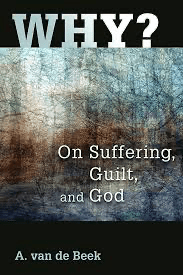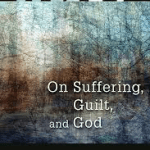“Why?” Chapter III, Part 14
Some here are reading with me “Why? On Suffering, Guilt and God” by Dutch theologian Abram van de Beek (vdB). We are now on chapters 14 and 15: “Evil and the Evil One” and “Gnosis.” If you are reading with me/us, feel free to comment, but if you are not reading, or have not read these chapters, please feel free to ask questions. Do not then offer comments.
In chapter 14, “Evil and the Evil One” vdB continues discussing theodicies that begin with the goodness of God rather than the omnipotence of God. Here, again, we will find hints of his own theodicy even though he is mostly discussing other theologians’ and philosophers’ attempts to justify the ways of God in the face of evil and innocent suffering.
Here I offer two brief quotations from this chapter that especially concisely express its thesis (whether vdB’s own or others’): “The power of sin does not exist by itself. Sin is a manifestation of the power of evil” and “By the sin of man the world in which we live has become the domain of sin.” (173) VdB is not satisfied with explanations of the power of evil that represent them as impersonal forces or merely the collective bad things people do (Walter Wink). On page 177 he begins to express a belief, whether his own or others’, that there is a power of evil that is supernatural and personal. On page 179 he briefly mentions the great German pastor-theologians father and son Blumhardt. Both were not by their own desires exorcists.
Throughout much of this chapter, again, vdB is sticking close to the Bible and shunning what he and others probably consider the vetoes of philosophies and modern sciences. According to him, and who can really dispute it?, the Bible portrays evil, including much sin and suffering, as originating in Satan and his minions. “We can say that the idea that Satan is the ultimate source both of sin and of suffering is not foreign to the biblical scriptures.” (189)
VdB debates Bultmann who wanted to “demythologize” the Bible’s references to supernatural, personal powers and principalities of evil. He argues that IF we do that, we ought to go all the way and demythologize God as well. (This was, of course, a course taken by Bultmann’s so-called “left wing disciples” Fritz Buri and Herbert Braun. Then vdB says “ If we [do] believe in the personal existence of thee devil and demons in the New Testament era, we have no reason whatever to doubt their existence in our day.” (198)
VdB ends this chapter (14) by arguing that we should experience “fresh reflection on the role of exorcism in the church.” (199) And he means in Protestant churches, as exorcism still does exist in Catholic churches. He admits that there are dangers and pitfalls to avoid if we do this, but doing it carefully would be “a sign of wisdom.” (200)
I plan to craft a separate blog post about chapter 15 as soon as possible (next). I fear that some of my commentaries about “Why?” Are too long for some readers. All I have to say about chapter 14 is that I find it refreshingly honest and thoroughly biblical. I have long wondered why conservative, evangelical Christian theologians and church leaders in the U.S. have by-and-large discarded Satan—from theological reflection—and why those few theologians who have devoted serious reflection to him/it have suffered ridicule and been marginalized. Here I will recommend one particular book by an influential evangelical theologian, admittedly British, about this subject: “I Believe in Satan’s Downfall” by Michael Green. It is, IMHO, the best biblical-evangelical treatment of the subject.
*Note: If you choose to comment, keep it relatively brief (no more than 100 words), on topic, addressed to me, civil and respectful (not hostile or argumentative), and devoid of pictures or links. I remind everyone that this is a safe place for evangelical Christians, broadly defined, to discuss theological and other issues of interest to us. It is not a place for anyone to attack, demean, ridicule or argue against evangelical Christian belief. Questions from unbelievers are welcome.*














